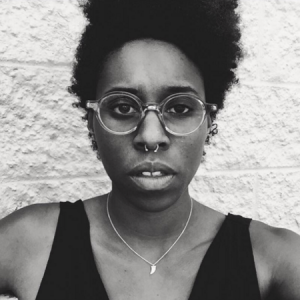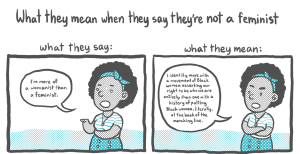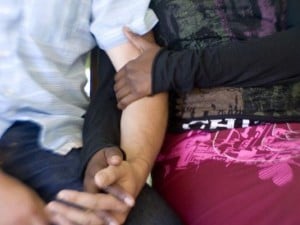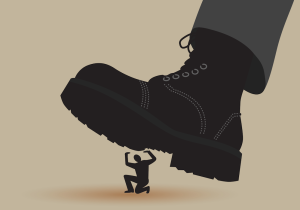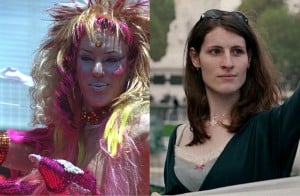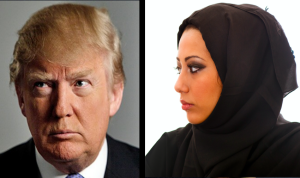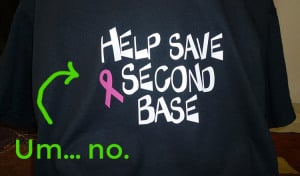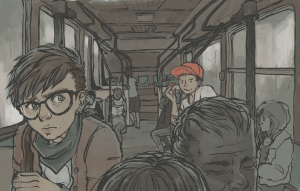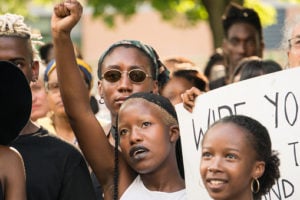Originally published on Romper and republished here with their permission.
I was surrounded by almost all white children growing up.
I was usually the only black girl in gymnastics, swimming class, ballet, golf. In any activity I did, I could guarantee I was the only one with brown skin and kinky hair.
From an early age I’d gotten used to hearing things like, “Do you tan?” and, “I wish I could have your skin.” Questions like, “Can I just cut your hair off and wear it for myself?” “Why is your hair nappy?” and “Why isn’t it soft like mine?” were always present.
It was normal for my friends to touch my hair and skin without asking, as if I was there for their amusement, because I looked and felt different.
I recall one time, at 12 years old, sitting in a cabin full of girls I was in Girl Scouts with when they told a black joke. It was uncomfortable, but I thought I was living in post-racial America, so I kept my objections to myself. I didn’t know it at the time.
I didn’t realize that, from the beginning, I’d been trying to make the white people around me comfortable with my otherness.
Even though all too often I was uncomfortable hearing the jokes about black people, uncomfortable with the touching of my body and the backhanded compliments, I put the needs, comfort, and safety of white people above my own.
Now, when someone questions why my skin is so dark, and when they express shock and surprise over my love Edwardian and Victorian literature, I know they believe they’re questioning my character, not their own.
These microaggressions reveal themselves everywhere throughout my day, sometimes even amongst my friends. It gave me an idea: what would happen if I directed those same microaggressions aimed at me back at white people?
How often do white people field comments about their hair and their skin? How often do they have people question their love of Chauncey and Shakespeare?
I thought I’d step in and give white people what they’ve been giving to me these past 28 years: racism, tucked right beneath the surface.
The Experiment
I knew the first few times I responded to a white person’s backhanded compliment with another backhanded compliment would probably feel a bit uncomfortable. So I gave myself two weeks.
I needed to get used to a new way of responding to racist words, a new way of standing up for myself; making myself more visible. I needed to get used to “backwards racism”: saying the things people felt totally comfortable saying to me back to them.
While normally I’d smile and try to redirect the conversation, for the next 14 days, I’d no longer being focusing on appeasing white people.
Now, all my attention was focused on appeasing myself.
Day 1 And Day 2
On the first day of my experiment, no one said anything remotely racist to me, even though I was like, “TRY ME! PLEASE!” I wanted to put to use all the phrases I’d been practicing in my head and in front of the mirror.
For a tiny moment, I thought that perhaps everyone had suddenly become enlightened and no longer systematically conditioned to be racist.
I was proven wrong on the second day though, when someone at a local coffee shop stopped me, complimented my hair, and then touched it without asking. Even though I’d prepared myself for it, I was momentarily frozen by shock.
Then I touched their hair back, which, if I’m being totally honest, I really didn’t want to do. It looked oily, and didn’t feel nice, but I did it anyway.
I think it startled them. I made sure to comment on how stringy it was, since they had commented on how surprisingly soft my hair is.
Which happens constantly. Like, what did you think my hair would feel like? A rock? It’s hair.
“Talking back” didn’t exactly feel powerful, the way I’d imagined it might be.
It made me feel small and powerless, like the only thing I could say and do was the very thing that had hurt me in the first place.
Day 2 And Day 3
After the first two days, I was feeling a little more confident in my responses. Which got me thinking about how I often choose to make white people comfortable when they speak to me.
I often do it over my own comfort out of fear I’ll be labeled an “angry” black woman, or “just like all of them.” I wondered: When did I learn this, and why have I continued it into my adulthood?
In the lobby of the Ace Hotel, someone sitting next to me made yet another comment about my hair. As they spoke, they stretched their hand out to touch it.
It happens almost once a day, yet never ceases to shock me.
The comment went something like this: “I love your hair! I bet it feels so cool!”
My response as I dodged their hand was, “I really don’t love your hair, and I doubt it feels that cool,” while I ran my fingers back their straight hair.
I know I was suppose to say back what they said to me, but I wanted to be honest, and I was frustrated. Why is it OK for strangers to touch me without permission?
I’m not here for anyone’s entertainment, or to be looked at and touched.
I don’t think they appreciated my comment, but I didn’t care. I didn’t appreciate the assumption that I would be OK being petted like an animal.
Later, I was having a conversation with a white male about what my dating experience as a black woman had been like. He rolled his eyes during many parts of our discussion, sometimes interjecting with “White women probably experience this stuff too…” and “Maybe you’re just overthinking it,” and advising me to “definitely don’t talk about race when you’re on a date!”
Instead of being quiet (which is what I normally do), I spoke up. I let him know that he had no right to tell me that my experiences weren’t valid simply because he couldn’t understand them.
I asked him to tell me stories of his horrible dating experiences, then I proceeded to let him know that I thought it was all in his head.
That those women he went on dates with were all in the right, and that he shouldn’t have put so much pressure on them to talk about his boring day-to-day life, or his ridiculous motorcycle. Then I let him know that the women were wise in not dating a person with no substance.
And I walked away, because I don’t have the space in my life to be told for the 100 time that I am not valid.
Day 5 And Day 6
Both of these days were uneventful, and purposefully so. I sat with other black women talking about my experiment and all the ways it was making me feel.
I asked them to share instances that really made them feel insignificant as humans. It was frustrating just how often we, as black women, have to encounter offensive words or behavior, and when we stand up for ourselves, we’re met with resistance. It’s incredibly paralyzing.
I was taking more notice than ever of the backhanded compliments, and all the racism that seeps through in everyday conversation. I wanted to fight back — but I was tired.
So for two days, I took care of myself and my spirit. Interacting with those who choose to tear me down wasn’t healthy.
Day 7 And Day 8
At this point in the experiment, I felt really irritated and actually didn’t want to interact with any white people — especially if the issue of race came up.
Unfortunately, that wasn’t an option. On day seven, we went out to a casino for the night to celebrate my partner’s birthday.
To be honest, I was anxious of what might happen.
There weren’t many other black people around, and when I smiled as I walked past people, no one returned the gesture. At one point an older man was holding the door for a white woman in front of me, and when he saw me he just glared and let the door go. I shouted after him “I didn’t need your help anyway!”
After that happened, I went up to my room, laid in bed, and cried. It was such a subtle thing that he did, and I’m sure he didn’t think twice about his actions.
I couldn’t stop thinking about it. I felt so dirty. And ashamed.
The next morning we ate downstairs at the buffet, which is honestly the best part of ANY casino I focused on getting my food and tried to ignore the staring.
While serving myself potatoes, one of the women working from behind the counter and called her friend over without even acknowledging me. She yelled, “I think she has the same hair as your mixed daughter!”
All I wanted to do was eat my food, but then the questions started. The woman behind the counter, who was white, asked about what I did to keep my hair looking like mine, so I explained that you have to keep kinky hair hydrated.
Was it time to go home yet?
Day 9 And Day 10
Honestly, I was dreading the fact that I’d signed up for this experiment.
I didn’t like that I had suddenly turned a magnifying glass onto my life. I didn’t like that I was facing racism head-on every time it happened.
I wanted to highlight how degrading it could be, how sad and frustrating of a process it was to always be aware of the ways people’s words can hurt.
While picking my kids up from school one afternoon, a mom came up to me and said, “You and your family are so beautiful! I love your style and your …” she paused, then added, “Look. May I photograph you guys sometime?”
I looked her in the eye and said, “Sure!” She proceeded to tell me about how hard it was to find black families like mine.
When I asked her what that meant, she tried to explain, but I interrupted saying: “You know what’s not hard to find? White families.”
I walked off to pick up my kids and I didn’t bother to look back her way.
Day 11 And Day 12
Since I was close to reaching the end of this experiment, I wanted to do something to celebrate, so a friend and I went dancing. It’d been a long week and it was wonderful to let loose.
In between songs, I went to the bar to grab a drink and two girls sat to my left. I smiled at them, and the one closest to me commented on my hair. I didn’t have any fight in me. I just sighed in reply.
I hoped nothing would follow that comment because a jam had just come on. I was wrong.
She said: “My friend here is a hair stylist and really would like to touch your hair.”
I don’t know what happened, but I let her touch it. I didn’t have the energy to say no.
After touching it, she said, “Wow, it’s a lot softer than I thought it was going to be.” That’s when I fired back: “What did you think it would feel like?! Your hair probably feels like straw with all the dyeing you’ve done to it.”
I didn’t wait for her to answer — I walked away.
The friend I was with, who also happens to be white, reminded me that I didn’t have to let her touch it. I know I didn’t, still, I did.
I was so upset with myself.
Day 13 And Day 14
That next morning, I cried in bed, fully aware of what happened the night before. The weight of paying attention to every offensive thing had finally taken its toll, and I was so happy to be finished.
Later in the day, a man made a comment to me about my skin, telling me how “jealous” he was of how it “handled the sun.”
I laughed and let him know he should be jealous, because there is no way I’d ever want skin that so easily burned when outside. He laughed and agreed. It did burn.
His words burned, too.
Did This Experiment Change Anything?
Handling these microaggressions had become second nature to me — so much so that prior to this experience, I just brushed them off, ignored them, and acted as if they didn’t bother me.
But while doing this experiment, I really paid attention to what was said to me and how it made me feel. At its end, I was reminded of how deep words can cut.
On day one, I had this vague idea of what this experiment would look like. By day 14, it had turned into something else entirely. I was exhausted. People felt like it was their right to touch my hair — like it belonged to them or it was a “sight.”
Feeling like I was constantly on display stripped me of my right to feel like a person. It made me angry, and I hated that I was giving anyone cause to think I was playing into the Angry Black Woman trope.
But I didn’t feel better making comments back to the people who’d directed them at me.
I don’t think it’s OK to speak to anyone in a way that’s demeaning, no matter what their race is. And the fact that I was just doing what had been done to me hung heavy on my heart.
If I’m honest, I think that I’ll just go back to ignoring the things that people say and the way their words make me feel.
It’s how I know to protect myself.
***
To read more from Romper, check out:
- I Won’t “Cover Up” Because I Have Kids & I’m Not Sorry
- What It’s Like To Be A Muslim Mom In The U.S. Right Now
- Why I Want My Biracial Kids To Identify As Black
[do_widget id=’text-101′]
Margaret E. Jacobsen was born, adopted, and raised in Southern California, and is now residing in Portland, OR. Mother of two, co-parenting with her ex-husband. In love with an activist, writing and taking photos, usually while eating burritos. She believes dancing can heal all the blues.
Search our 3000+ articles!
Read our articles about:
Our online racial justice training
Used by hundreds of universities, non-profits, and businesses.
Click to learn more


